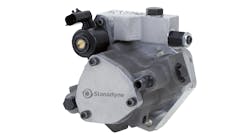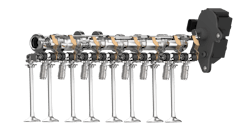Three distributors representing a cross section of the industry addressed challenges they face during the GAAS panel discussion “Distribution Headwinds and Tailwinds” May 21 in Chicago.
“We were going to call this panel “What keeps you up at night?” but decided that was too negative,” said panel moderator Larry Northrup, senior director, member relations, Automotive Aftermarket Industry Association (AAIA).
Despite the name change, the panel tackled some of their biggest challenges, such as the demands of the business, industry consolidation and the Patient Protection and Affordable Care Act, which is often called Obamacare.
Industry demands
“Distributors are feeling more pressure to deliver every part from every warehouse to every customer now,” Northrup said. “How do you deal with that?”
“We absolutely need to do that,” said Tim Trudnowski, AAP, President/General Manager, Automotive Jobbers Supply. “All of our company owned stores get deliveries twice a day, some three times a day. Our inventory is their inventory. We fine-tune our deliveries to provide the best service possible.”
Scott Grill, VP and CPO, Auto-Wares, agreed that the customers’ expectations must be met.
“We have seven full-service warehouses. We shuttle parts every night so jobbers can get it the next morning or sooner. We have up to seven deliveries a day to some of our customers. We do the best we can to them as many parts as many times a day as possible because their business depends on it.”
Brent Windom, senior VP, sales and marketing, UNI-Select USA, agreed.
“Distribution is our core. We must have all the essential parts in the markets where they are needed. In some markets, such as Buffalo, we have over 27 deliveries per week. We do shuttles, hot shot deliveries, and others. It is all about the shop’s demands. We built our business on doing deliveries in 30 minutes or less, which remains a key objective.”
Trudnowski said, “We live and die by hot shot deliveries. That is the norm to all of our stores. The shops we deal with are the survivors today and so are we. We want to stay there and continue to work with them.”
Grill said that the company’s Parts Express does two to five runs from the warehouse each day. “In April, those hot shot runs generated $3.4 million for us and 52 percent of all those deliveries were stuff they didn’t have and could not get from somebody else at that time.”
Windom said that express business is a major part of UNI-Select’s business.
“Our express counters do 20 to 30 percent of our revenues,” he said. “We are in so many metro markets in the U.S. and Canada. The big boxes have come in and put pressure on us to be better. Our success will be measured on how we deploy inventories. It is a challenge. Certain product lines we just say yes to our customers. We will have the product on our shelves. We spend a ton of money doing that. Deployment strategy is critical to succeed against the big box guys.“
Industry consolidation
Northrup asked the panel about how industry consolidation creates uncertainty in the industry and how businesses protect against problems that can create.
“Consolidation is a way of life,” Windom said. “We built our business on relationships. When you deal with all the manufacturers, as we do, it has a way to work itself out. You need to make sure you have communication and trust to avoid frustrations and pitfalls. Manufacturers’ changes affect us and our changes affect our customers. The technician does not care that we or our suppliers are going through computer changes. They just want the part.”
Trudnowski said that when suppliers make changes, such as a new computer system, that effects business.
“Partnering with the right suppliers is important,” he said. “We have to have relationships with our customers. We lose some local reps due to consolidations. They all affect us on pricing service levels and where our parts come from. We need to be able to take care of the outside sales force. On the inventory side we try to have a secondary line from a different supplier.”
Grill said that Auto-Wares will beef up on their inventory when necessary to deal with business disruptions.
Obamacare costs
“Obamacare starts this October,” Northrup said. “How are you going to deal with that?
Trudnowski said that all his employees are full-time, and is concerned about maintaining benefits for all.
“We take pride that our 107 employees all are full-time employees,” he said. “We don’t know the full impact that Obamacare will have on us. What will it cost us and our employees? We recently had a 20 percent increase in medical care that cost us another $94,000. We pay over $600,000 in premiums for our little company. There still are a lot of things that need to be written about this law. The next several months will be interesting to see what happens.”
Grill said that Auto-Wares is a larger company with part-time employees.
“We are bigger than Tim’s company. We have over 1,800 employees. We would love to take care of them all like they are your own, but you can’t. We have full and part time employees. Number of part time employees is growing over the number of full-time employees. We have asked employees to contribute more toward their health care costs. We also look very closely at sales per employee at the stores to make sure we are staffed correctly.”
Windom said that his company has to manage employee benefits across multiple countries.
“Uni-Select is a Canadian company that has adapted to health care costs. We have over 3,800 employees in the U.S. If we don’t change any coverage it will cost us multi million dollars to provide it,” Windom said. “We will go to 25 hours a week for part time. It will impact the workforce. Two-thirds of our cost is payroll and you have to manage that. Benefits are 22 percent of our payroll. We can’t just tack on $2 million to our payroll due to increased medical costs. We still need to find our all the facts. The worst-case scenarios are frightening. Ultimately we win in the industry because of the service we give and the relationships we have. That is all made possible because of our people.”
Subscribe to Aftermarket Business World and receive articles like this every month….absolutely free. Click here.

